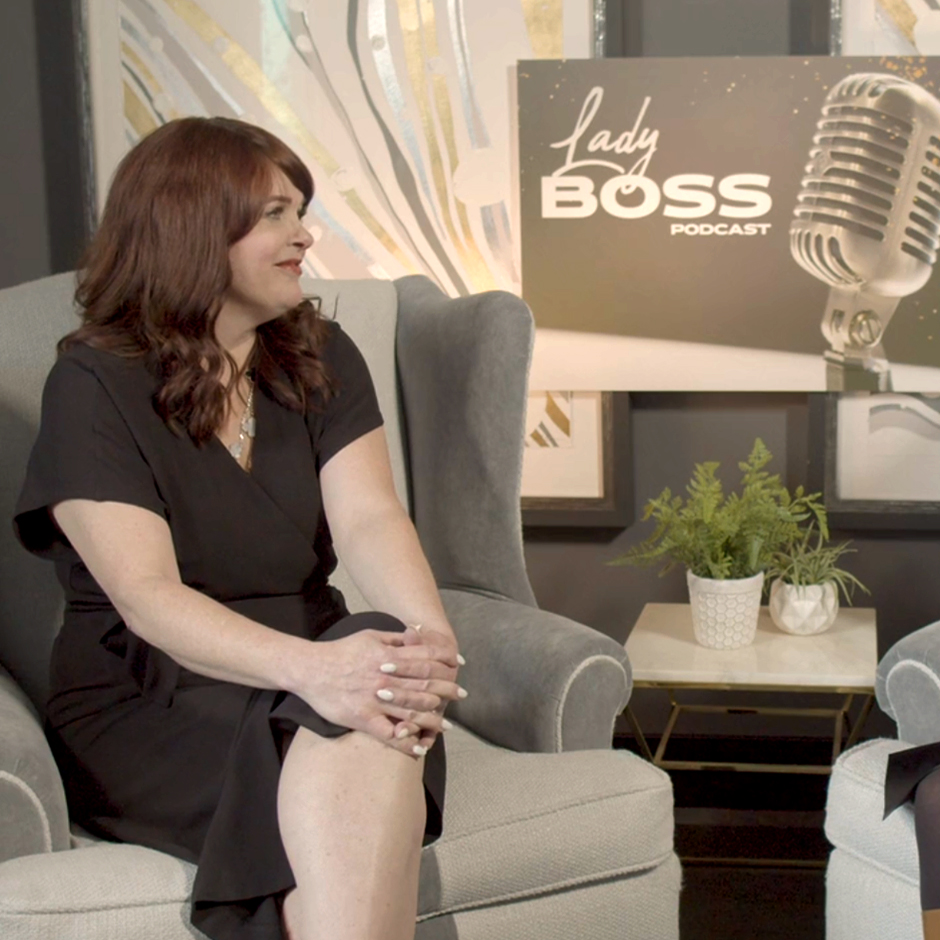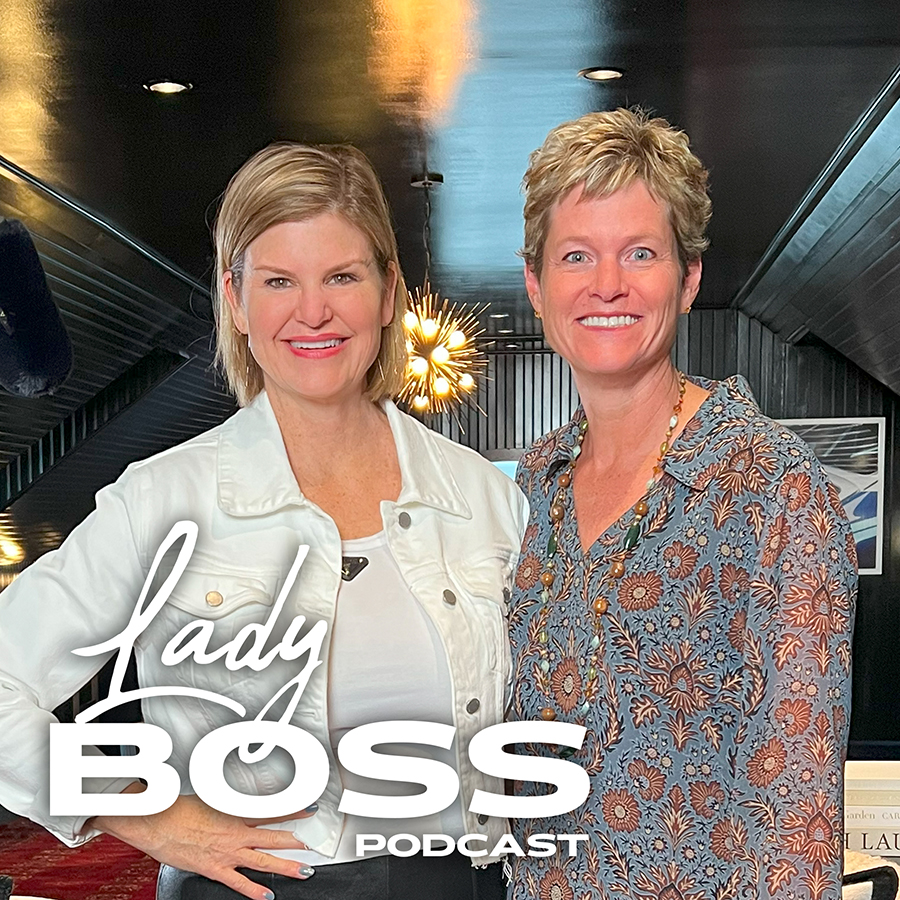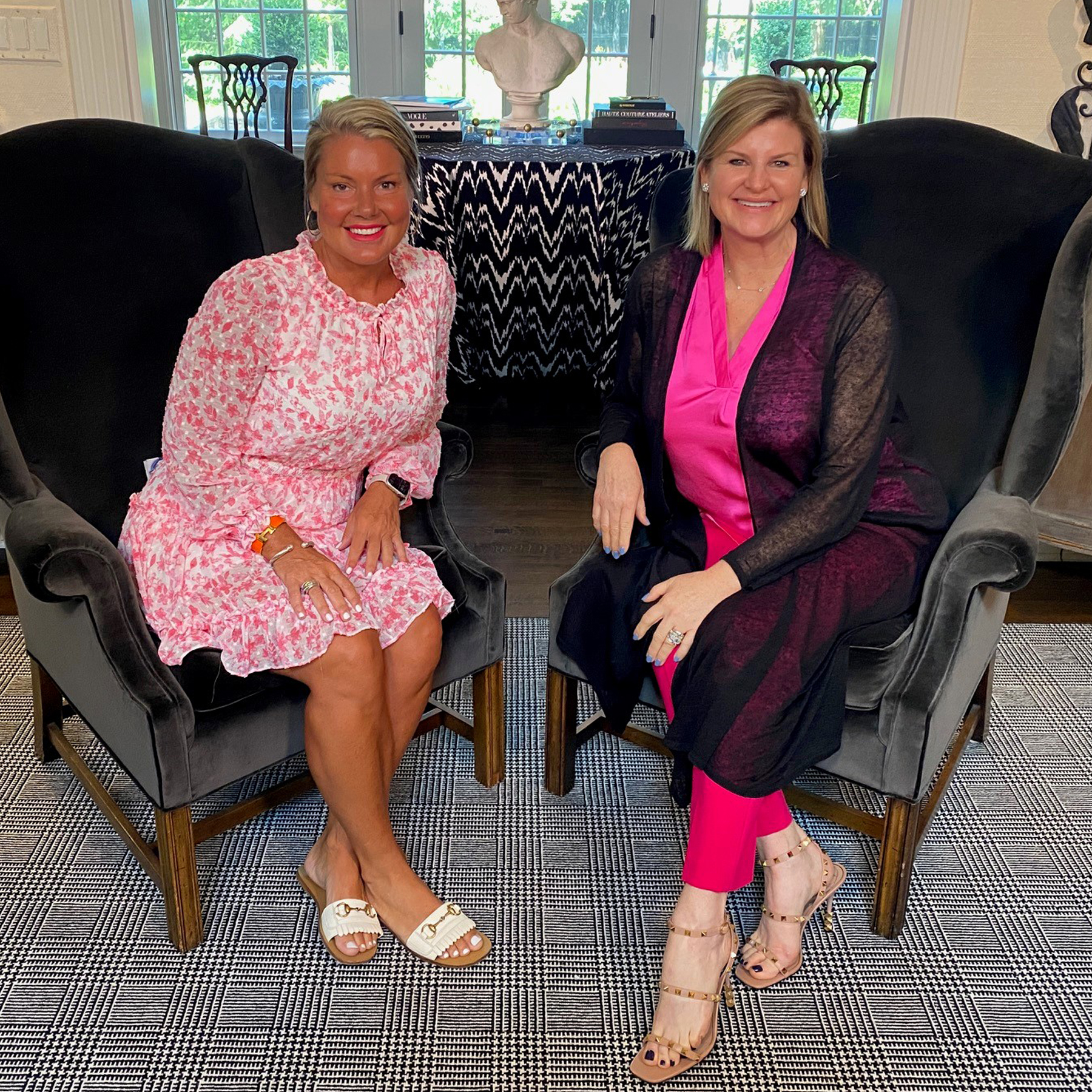Episode Transcript
[00:00:00] Speaker A: Today on Ladyboss Courtney talks with Allison Beitzel, who took her passion and turned it into profit, using her love of food, design, and entertaining to create a booming new business.
[00:00:10] Speaker B: Allison, I've always heard that when you're an accountant, you're not supposed to be a creative accountant.
[00:00:15] Speaker C: I know, right?
[00:00:16] Speaker B: And yet you find yourself in this very, very creative business. Where are you pulling that from?
[00:00:21] Speaker C: To be quite honest, I have no idea. I mean, I am definitely an accountant and could see on my grazing tables, my straight lines and my organization from the business side, but I'm definitely an accountant at heart, for sure.
[00:00:34] Speaker B: That comes in very handy for the finances of the business, which we'll get to. But I am really impressed with the aesthetics, which I don't ever associate our accounting team at work to be the people picking out the aesthetics, and we're in a very creative business at Gemini builds it. So that's what surprises me most about how amazing your stuff looks thank you. When you decided to do babs boards, how much of it was, hey, I've got to make a certain amount of money because I'm none of it. So this is really your retirement play? In a sense, yeah.
[00:01:07] Speaker C: I mean, it was really just created on a whim. I mean, I went to go visit a dear friend of mine who helped me come up with the idea, and I wanted something to fill my free time, quite honestly, and it was just something for fun to start off with.
[00:01:21] Speaker B: So when you don't have a bullet to your head about paying any bills or employees, what gives you the drive?
[00:01:28] Speaker C: Passion, and love. I mean, hopefully you could see that you took a class for me at Wrigley. I mean, I love teaching, and, I mean, I started doing it as charcuterie for fun, and then it moved into teaching quite quickly, teaching charcuterie classes. But I'm really doing it because I love it, and I think that's what's so fun is. It's something that I can make into a business, but it's really, truly what I love doing.
[00:01:52] Speaker B: And how do you hold yourself accountable if, in fact, you don't have a commitment to your family or a commitment to yourself or certain thresholds that you're trying to meet?
[00:02:03] Speaker C: Right. And I think that's kind of where my finance and accounting background comes into play. I mean, I know what it takes to run a business and make it profitable. I'm really on top of all of the financial side of it, so I know I want to make money. I don't want to lose money doing it. But I think that's kind of where my business background comes into play, for sure.
[00:02:23] Speaker B: Okay, good. I think it's just important to hear otherwise. We call that a hobby.
[00:02:26] Speaker C: Yeah, it's definitely not a hobby. I mean, it started off as just for fun and to see how it goes, but now that it's kind of grown. I want to be successful at it, too. And I'm not making millions and millions of dollars.
Yes, not yet, but I'm having a lot of fun doing it and making some money along the way, too.
[00:02:47] Speaker B: Are you a natural business builder? Because I think first few times I tried to connect with you, you were sold out. And that's always alarming for any business. And then right away, I saw you had classes and obviously took one. And now I want you to talk a little bit about your new partnership.
How'd you get those ideas, because those are ideas after infancy. It's, hey, how do I scale this? How do I get it beyond me, right?
[00:03:12] Speaker C: I've been doing this for two years now. Next month, which I cannot believe it's been that long. It's gone so fast. But it definitely started off saying yes to everything. And as a new business person, I wanted to see what I liked. I wanted to see what I didn't like doing. I wanted to see what worked, what didn't. So I said yes to everything. And now, two years in, I'm realizing, okay, here's what didn't work. Here's what was profitable. Part of it, here's what I really love doing. So the Forza partnership that you're talking about, that I just announced yesterday, was a perfect segue for me to scale the business. So I don't have to say no to people who are ordering charcuterie boards. I'm able to say yes through Forza, putting them together and preparing them, and I could focus on what I really love and growing the class side and the grazing tables, which is what I absolutely love the most.
[00:04:02] Speaker B: Okay, so not dissimilar to our business, where ecommerce art companies will come to us. They're good at finding football jerseys that they want to sell online, and they need thousands and thousands of frames per week. And we'll be the people to produce all the frames and the glazing and all the things, and they focus on the part they love.
[00:04:19] Speaker C: Right.
[00:04:20] Speaker B: You have figured out a way to outsource what's the least value add of your business, which is the one off charcuterie board. Right.
[00:04:28] Speaker C: And it's not that I don't love doing that. I love doing it all. I just am one person. Right. And I mean, I have a couple interns, but I'm one person running this business. So what made the most sense for me to outsource, definitely as a partner? Tyler and I tyler one of the owners of Forza, and I go way back. I've known him prior to when he started Forza, so we have built this relationship. And then I've done classes, charcuterie classes at Forza now, grilling classes at Forza. So we've had this ongoing relationship for a couple years now with the business. So it just made the most sense. It was the perfect fit.
[00:05:02] Speaker B: And how does that work financially, what our arrangement is, generally speaking, how much is a charcuterie board?
[00:05:10] Speaker C: Well, it depends on the size, but anywhere from $100 to $200 for kind of standard sizes. And we've just come to the agreement that I'm still doing all the invoicing all of the sourcing of the clients and the customers still all the instagram. I'm doing the selling part of it. So really I'm just outsourcing to him. And what's nice about it is he gets wholesale costs, which I wasn't getting because he runs this business. He already has meat and cheese there. He already has a labor force, so it's great. So we both win off of it, which I think is wonderful. And he gets new clients coming through his door to pick up the charcuterie boards that he might not have had before, and then he also will get that point of sale, too.
[00:05:55] Speaker B: Okay.
[00:05:55] Speaker C: Yeah.
[00:05:55] Speaker B: I want to make sure people hear that that the proportionate amount of profit, if you will, is coming from the person that generated the customer.
[00:06:06] Speaker C: Which is you. That's me. Right.
[00:06:08] Speaker B: And I think that a lot of businesses, every one of us has to think about getting customers because the value is whether you get that customer and you service it through online retail, partnership, wholesale, the value is the customer.
[00:06:23] Speaker C: Right.
[00:06:24] Speaker B: You can always find people, firms, supermarkets to produce stuff on the back end where they're leveraging an infrastructure. But getting the customer generates the most value.
[00:06:34] Speaker C: And that's what I've worked really hard to do the last two years, is getting this customer base. And it's a very loyal customer base, too.
I have people that are ordering boards repeatedly, and I'm sorry that I've said no to you on yours. You've been trying to can I please have a board? But I have these loyal customers and also that are taking my classes, too, and are also hiring me to do grazing tables. So it's this huge base that I've built the last two years that I'm helping Forza. And then same with him. He has a base, too, that I haven't tapped into that now this collaboration is going to allow for both of us. He hasn't been able to sell grazing tables because he doesn't have the infrastructure to do that. Now he'll be able to say, oh, I have Babs to do grazing tables for me forza. Right. Oh, nice. And he's helping me market that. I'll be the one who's doing it for forza, which is wonderful. So it's a win win.
[00:07:30] Speaker B: So what's been your best marketing vehicle?
[00:07:34] Speaker C: Instagram, for sure. Social media in general, but mostly Instagram. I mean, I had no idea starting this, the power of social media and Instagram and selling a business, selling what I have to sell, for sure.
[00:07:50] Speaker B: If you had to do it, my.
[00:07:51] Speaker C: Marketing budget is zero.
[00:07:52] Speaker B: Okay, so you don't have to boost or do it 3600 followers by organically building it.
[00:07:59] Speaker C: Yes.
I mean, I have donated to charities, which I think is kind of marketing, and I'm putting my name out there. But aside from that, no, I've not spent a dime.
[00:08:10] Speaker B: Wow, that's impressive. And what does Instagram give you, would you say? Is it leads and then just people seeing?
[00:08:19] Speaker C: I think the business that I'm in at least, is very visual. So you're seeing people at classes, you're seeing the grazing tables that I'm doing. So it's all the pictures, and I don't have any fancy equipment. I'm using my iPhone to take these pictures. But just that visual that you're seeing on social media really sells the business a lot for me.
[00:08:39] Speaker B: Yeah, that's great. So grazing tables are kind of a trend, and so are Shakuri birds. I mean, a lot of 22 year olds are really after it. What comes next, though? Because I think you always have to be ahead of that before Salami dies off.
[00:08:52] Speaker C: Yes. Right.
[00:08:53] Speaker B: What do you think?
[00:08:54] Speaker C: To be honest, I didn't even think that it would last. The craze would last for two years, to be quite honest with you. So I'm very lucky that it has extended. But I'm really trying to follow what my passions are to figure out what's next. And that passion really is teaching. So charcuterie classes I'm still doing. I've now rolled into teaching grilling classes, which I love, and specifically girls who grill. So I'm trying to teach this whole girls grilling class, which is so much fun. And then I have a couple of other ideas in mind of other classes to teach. Kind of hosting 101. Hosting a dinner party 101. I feel like the art of the dinner parties kind of lost some steam maybe during COVID or maybe just this generation a little bit. So I would love to bring that back.
[00:09:42] Speaker B: Cool.
[00:09:42] Speaker C: That's next for me.
[00:09:44] Speaker B: Well, I don't know if you were a B accountant and an A entrepreneur or what happened, but I think your creative plug is so great. I know it's not super popular desserts right now, but I think there's so many more boards besides appetizer boards that could be brought out for people to gift, which I think is and then The Experience Play. I think you're really tapping into what seems so popular after COVID is the Experience Play.
[00:10:12] Speaker C: Right.
[00:10:13] Speaker B: So as you look at how do you look at your business and say, financially, is this a success? What does that look like?
[00:10:21] Speaker C: Right? I mean, to me personally, a success is, am I having fun? And I am I'm having a blast.
It sounds so cliche to if you are enjoying what you're doing, it doesn't feel like work. It's really true for me. I mean, I love it. I love doing this today. I have a grazing table and a class this evening. I just truly love it. So that, to me, is the most important part of the success. It's not necessarily the money, but the money is great, too. I have some extra spending money that I didn't even plan on when I started this. So it's also successful for me that I'm making a profit.
[00:10:59] Speaker B: And is it a business you ever have to add people to or you just keep it small?
[00:11:03] Speaker C: Yeah, I mean, I think having the partnership with Forza allows me to keep it small. I have a couple interns last summer and then I have another one who just started last night, high schoolers. And it's a great experience for them to see an entrepreneur, a brand new business, really from the ground up. So that's been a lot of fun. But I don't know, I think I don't need a storefront. I think what I'm doing works for me right now, and I love it.
[00:11:29] Speaker B: That's great. I mean, you make it sound easy. I think a lot of entrepreneurs, I think you're smart to keep it small and focused. So you are having fun. I think that's when I just run into too many people that want to call it a business to call it a business, you got to start adding people. You got to have growth, accountability, goals, and this is kind of something for more fun. And Solopreneurship is a great thing for people that don't want to have a gun to their head, so to speak. I think it's amazing that you're having fun and your passion is just going to keep growing it, and it'll excited to see what's next for Bazboard.
[00:12:06] Speaker C: Thank you. Me too. I appreciate it.


